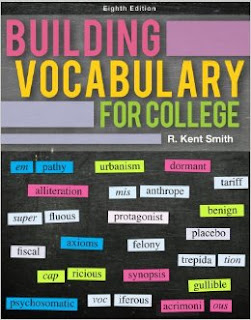pre-: in advance
predict(v.)
\pri-ˈdikt\
to say that (something) will or might
happen in the future
She claims that she can predict future events.
preview(v.) \ˈprē-ˌvyü\
to see, hear, or show something
(such as a movie) before it is available to the public
The designers will preview their new lines at the fashion
show.
con-: with, together
context(n.) \ˈkän-ˌtekst\
the words that are used with a certain word
or phrase and that help to explain its meaning
conclude(v.)
\kən-ˈklüd\
to stop or finish : to come to an
end : to end in a particular way or with a particular action
The chairman concluded by wishing us all a happy holiday.
hoist(n.)
a machine used for lifting heavy loads
crane(n.)
a big machine with a long arm that is
used by builders for lifting and moving heavy things
fin-: end
finish(v.)
\ˈfi-nish\
to reach the end of (something)
He started his homework two hours ago and he still
hasn't finished.
final(adj.) \ˈfī-nəl\
happening or coming at the end; being the last in a
series, process, or progress
They won their final four games.
ann-: year
anniversary(n.)
\ˌa-nə-ˈvərs-rē, -ˈvər-sə-\
a date that is remembered or celebrated
because a special or notable event occurred on that date in a previous year
The exhibit will close on the 100th anniversary of
the artist's death.
annual (adj.)
\ˈan-yə(-wə)l, -yü-əl\
happening once a year
The company charges an annual fee of $45.
Jesus knocking the door
三個對文字重要貢獻的人
1.
William
Caxton出版社老闆
2.
James
I
3.
Sammel
Johnson
英美差異
|
英
|
美
|
|
catalogue
|
catalog
|
|
programme
|
program
|
|
litre
|
liter
|
ambi-: both
ambiguous(adj.)
\am-ˈbi-gyə-wəs\
able to be understood in more than one way : having more
than one possible meaning
Due to the ambiguous nature of the question, it was
difficult to choose the right answer.
mor-: death
morgue(n.) \ˈmȯrg\
a place where the bodies of dead people are kept until they are
buried or cremated
mortician(n.)\mȯr-ˈti-shən\
a person whose job is to prepare dead people to be buried and to arrange
and manage funerals
The History of
English in Ten Minutes
誰說讀文學沒用處







